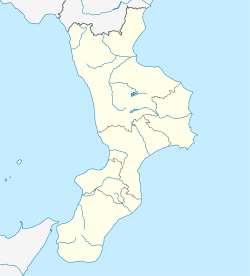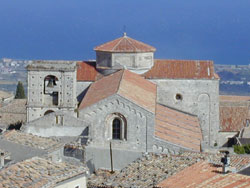| Revision as of 23:27, 25 June 2006 editAttilios (talk | contribs)Autopatrolled, Extended confirmed users, Pending changes reviewers172,812 editsm expanded, requested to use images to the official website. Stay connected!← Previous edit | Revision as of 12:25, 26 June 2006 edit undoAttilios (talk | contribs)Autopatrolled, Extended confirmed users, Pending changes reviewers172,812 editsm added imagesNext edit → | ||
| Line 20: | Line 20: | ||
| website = | | website = | | ||
| }}'''Gerace''' is a town in the ], ], ]. | }}'''Gerace''' is a town in the ], ], ]. | ||
| ] | |||
| Gerace is located several miles inland from ], yet the latter town and the Sea can be seen from Gerace's perch atop a 1/2 km vertical rock. The town stands on a hill formed of conglomerates of sea fossils from 60 millions years ago. | Gerace is located several miles inland from ], yet the latter town and the Sea can be seen from Gerace's perch atop a 1/2 km vertical rock. The town stands on a hill formed of conglomerates of sea fossils from 60 millions years ago. | ||
| Line 27: | Line 27: | ||
| Later, even during the highest splendour of Locri, the hill was inhabited and was later the seat of a Roman military garrison. After the ] reconquest of Italy (6th century), the town became an administrative, military and religious capital under the name of '''Santa Ciriaca'''. | Later, even during the highest splendour of Locri, the hill was inhabited and was later the seat of a Roman military garrison. After the ] reconquest of Italy (6th century), the town became an administrative, military and religious capital under the name of '''Santa Ciriaca'''. | ||
| ] | |||
| In 986 the Saracens conquered briefly the city, but it returned under the ]s until the ] conquest in 1059. Gerace was seat of a principality, whose symbol was the Castle. It subsequently followed the history of the ]. During the ] (late 13th century), Gerace was occupied by the Aragonese Admiral ] who turned it into a feud of his own; later it became a "Royal City". | In 986 the Saracens conquered briefly the city, but it returned under the ]s until the ] conquest in 1059. Gerace was seat of a principality, whose symbol was the Castle. It subsequently followed the history of the ]. During the ] (late 13th century), Gerace was occupied by the Aragonese Admiral ] who turned it into a feud of his own; later it became a "Royal City". | ||
| Line 33: | Line 33: | ||
| A new modern town, Gerace Marina, was built on the coast in the 19th century to house new public buildings. Gerace Marina changed name to Locri in 1934. | A new modern town, Gerace Marina, was built on the coast in the 19th century to house new public buildings. Gerace Marina changed name to Locri in 1934. | ||
| ] | |||
| ==Main sights== | ==Main sights== | ||
| The main attractions of Gerace are the remains of the old '''Norman Castle''' (probably begun in the 10th century by the Byzantines) at the top of Gerace, and the perfectly preserved medieval town. It was once home to 60 churches; the most noteworthy amongst the remaining ones include: | The main attractions of Gerace are the remains of the old '''Norman Castle''' (probably begun in the 10th century by the Byzantines) at the top of Gerace, and the perfectly preserved medieval town. It was once home to 60 churches; the most noteworthy amongst the remaining ones include: | ||
| Line 40: | Line 40: | ||
| *the small '''San Giovannello''' ("Little St. John", 10th century) | *the small '''San Giovannello''' ("Little St. John", 10th century) | ||
| *'''Santa Maria del Mastro''' (1083), of Greek rite until 1480. | *'''Santa Maria del Mastro''' (1083), of Greek rite until 1480. | ||
| ==Image gallery== | |||
| <gallery> | |||
| Image:Gerace_San Francesco Portal.jpg|<center>Portal of the church of St. Francis | |||
| Image:Gerace_interno_cattedrale_3.jpg|<center>Interior of the Cathedral | |||
| image:Gerace San Giovannello.jpg|<center>Church of San Giovannello | |||
| Image:Gerace San Martino.jpg|<center>Church of San Martino | |||
| </Gallery> | |||
| {{Italy-geo-stub}} | {{Italy-geo-stub}} | ||
| <BR> | <BR> | ||
Revision as of 12:25, 26 June 2006
Comune in Calabria, Italy| Comune di {{{name}}} | |
|---|---|
| Comune | |
| Location of {{{name}}} | |
  | |
| Coordinates: 38°16′N 16°13′E / 38.267°N 16.217°E / 38.267; 16.217 | |
| Country | Italy |
| Region | Calabria |
| Province | Reggio Calabria (RC) |
| Government | |
| • Mayor | Salvatore Galluzzo |
| Area | |
| • Total | 28.99 km (11.19 sq mi) |
| Population | |
| • Total | 2,600 |
| Time zone | UTC+1 (CET) |
| • Summer (DST) | UTC+2 (CEST) |
| Postal code | 89040 |
| Dialing code | 0964 |
| Website | comune.gerace.rc.it |
Gerace is a town in the province of Reggio Calabria, Calabria, Italy.

Gerace is located several miles inland from Locri, yet the latter town and the Sea can be seen from Gerace's perch atop a 1/2 km vertical rock. The town stands on a hill formed of conglomerates of sea fossils from 60 millions years ago.
History
The name of the city derives from the Greek Ierax ("Sparrowhawk). According to a legend, the inhabitans of the coast, fleeing from a Saracen attack in 915 CE, were led by a sparrow-hawk to the mountains commanding the area of Locri, and here they founded the city. Archeological findings have showed that the area was in fact inhabited since the Neolithic Age; also traces of Sicel presence have been found.
Later, even during the highest splendour of Locri, the hill was inhabited and was later the seat of a Roman military garrison. After the Byzantine reconquest of Italy (6th century), the town became an administrative, military and religious capital under the name of Santa Ciriaca.

In 986 the Saracens conquered briefly the city, but it returned under the Byzantines until the Norman conquest in 1059. Gerace was seat of a principality, whose symbol was the Castle. It subsequently followed the history of the Kingdom of Naples. During the Sicilian Vespers (late 13th century), Gerace was occupied by the Aragonese Admiral Roger of Lauria who turned it into a feud of his own; later it became a "Royal City".
In 1348 it became a county, a possession of the Caracciolos, Consalvo de Cordova and, as a principality, of the Grimaldi (end of the 16th century). With the abolition of feudalism in 1806, Gerace became district capital.
A new modern town, Gerace Marina, was built on the coast in the 19th century to house new public buildings. Gerace Marina changed name to Locri in 1934.

Main sights
The main attractions of Gerace are the remains of the old Norman Castle (probably begun in the 10th century by the Byzantines) at the top of Gerace, and the perfectly preserved medieval town. It was once home to 60 churches; the most noteworthy amongst the remaining ones include:
- St. Francis (13th century), containing a precious Baroque altar
- The Norman Cathedral, including the prison of the Five Martyrs of Gerace (1045). It hasa nave and two aisles, each divided by 13 columns coming from the ancient temples of Locri.
- the small San Giovannello ("Little St. John", 10th century)
- Santa Maria del Mastro (1083), of Greek rite until 1480.
Image gallery
-

Portal of the church of St. Francis -

Interior of the Cathedral -

Church of San Giovannello -

Church of San Martino
This Italian location article is a stub. You can help Misplaced Pages by expanding it. |
- "Superficie di Comuni Province e Regioni italiane al 9 ottobre 2011". Italian National Institute of Statistics. Retrieved 16 March 2019.
- "Popolazione Residente al 1° Gennaio 2018". Italian National Institute of Statistics. Retrieved 16 March 2019.
